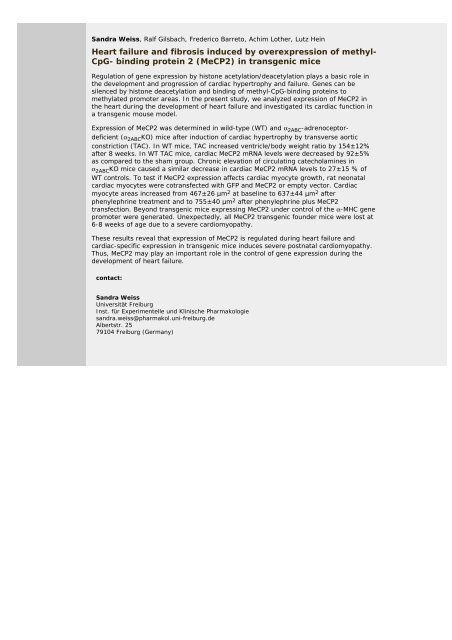Abstracts (poster) - Wissenschaft Online
Abstracts (poster) - Wissenschaft Online
Abstracts (poster) - Wissenschaft Online
You also want an ePaper? Increase the reach of your titles
YUMPU automatically turns print PDFs into web optimized ePapers that Google loves.
Sandra Weiss, Ralf Gilsbach, Frederico Barreto, Achim Lother, Lutz Hein<br />
Heart failure and fibrosis induced by overexpression of methyl-<br />
CpG- binding protein 2 (MeCP2) in transgenic mice<br />
Regulation of gene expression by histone acetylation/deacetylation plays a basic role in<br />
the development and progression of cardiac hypertrophy and failure. Genes can be<br />
silenced by histone deacetylation and binding of methyl-CpG-binding proteins to<br />
methylated promoter areas. In the present study, we analyzed expression of MeCP2 in<br />
the heart during the development of heart failure and investigated its cardiac function in<br />
a transgenic mouse model.<br />
Expression of MeCP2 was determined in wild-type (WT) and α 2ABC -adrenoceptordeficient<br />
(α 2ABC KO) mice after induction of cardiac hypertrophy by transverse aortic<br />
constriction (TAC). In WT mice, TAC increased ventricle/body weight ratio by 154±12%<br />
after 8 weeks. In WT TAC mice, cardiac MeCP2 mRNA levels were decreased by 92±5%<br />
as compared to the sham group. Chronic elevation of circulating catecholamines in<br />
α 2ABC KO mice caused a similar decrease in cardiac MeCP2 mRNA levels to 27±15 % of<br />
WT controls. To test if MeCP2 expression affects cardiac myocyte growth, rat neonatal<br />
cardiac myocytes were cotransfected with GFP and MeCP2 or empty vector. Cardiac<br />
myocyte areas increased from 467±26 µm 2 at baseline to 637±44 µm 2 after<br />
phenylephrine treatment and to 755±40 µm 2 after phenylephrine plus MeCP2<br />
transfection. Beyond transgenic mice expressing MeCP2 under control of the α-MHC gene<br />
promoter were generated. Unexpectedly, all MeCP2 transgenic founder mice were lost at<br />
6-8 weeks of age due to a severe cardiomyopathy.<br />
These results reveal that expression of MeCP2 is regulated during heart failure and<br />
cardiac-specific expression in transgenic mice induces severe postnatal cardiomyopathy.<br />
Thus, MeCP2 may play an important role in the control of gene expression during the<br />
development of heart failure.<br />
contact:<br />
Sandra Weiss<br />
Universität Freiburg<br />
Inst. für Experimentelle und Klinische Pharmakologie<br />
sandra.weiss@pharmakol.uni-freiburg.de<br />
Albertstr. 25<br />
79104 Freiburg (Germany)

















